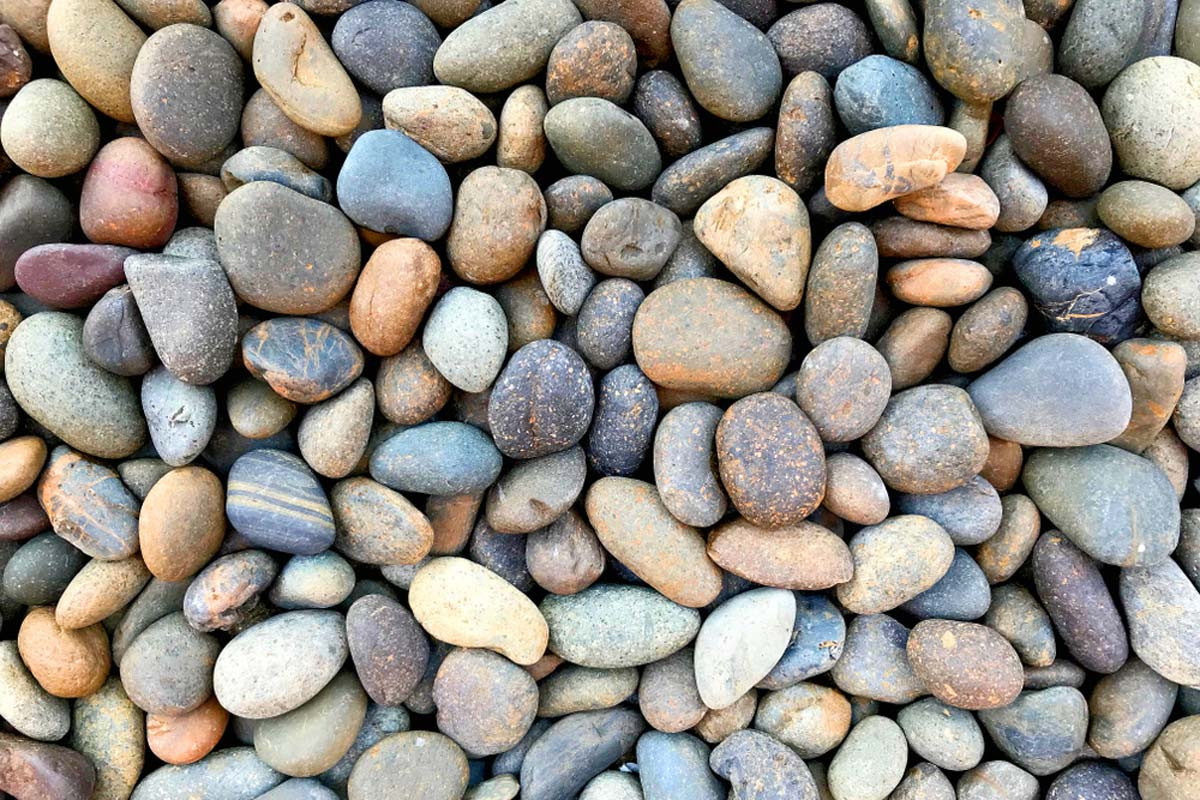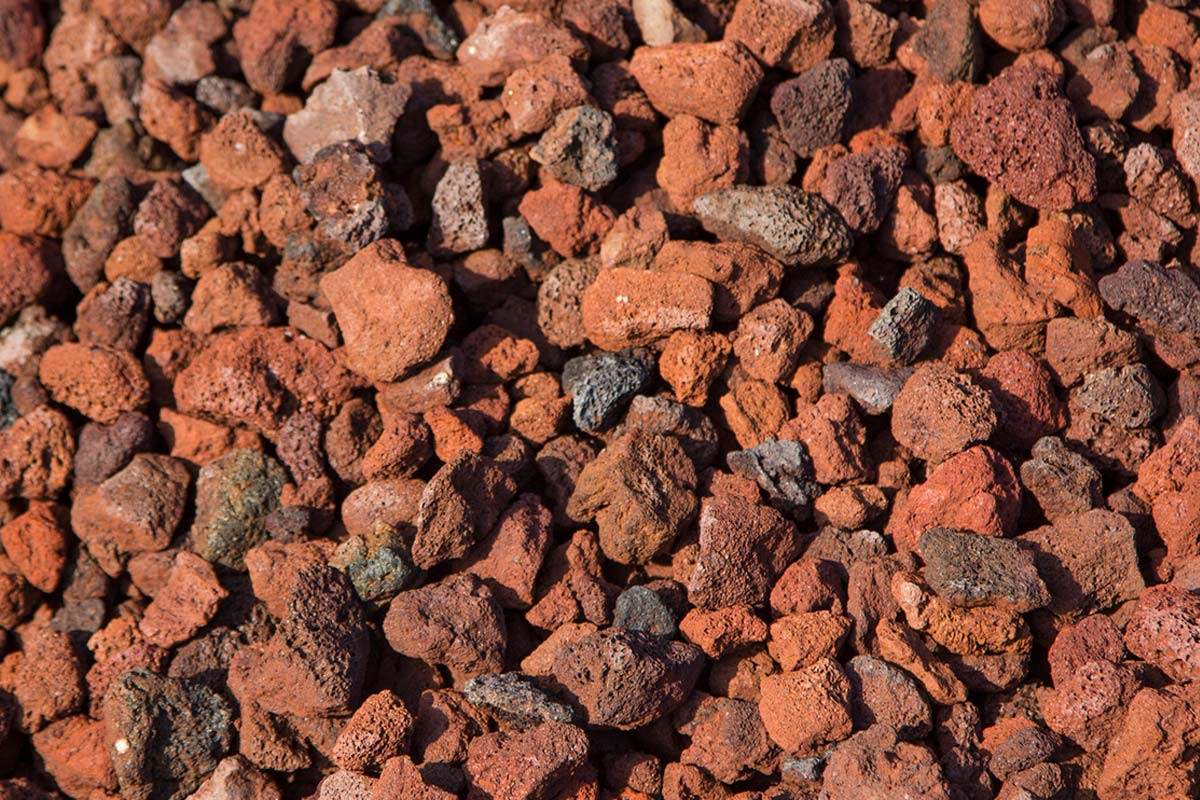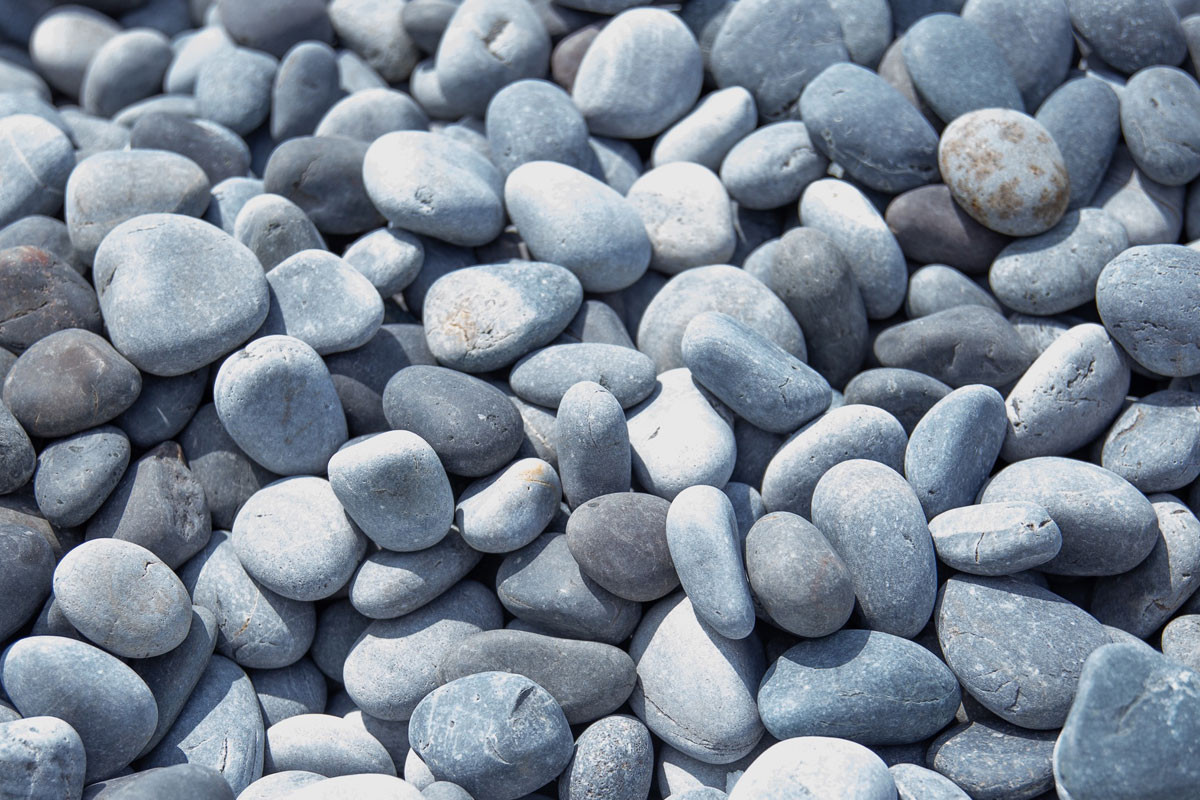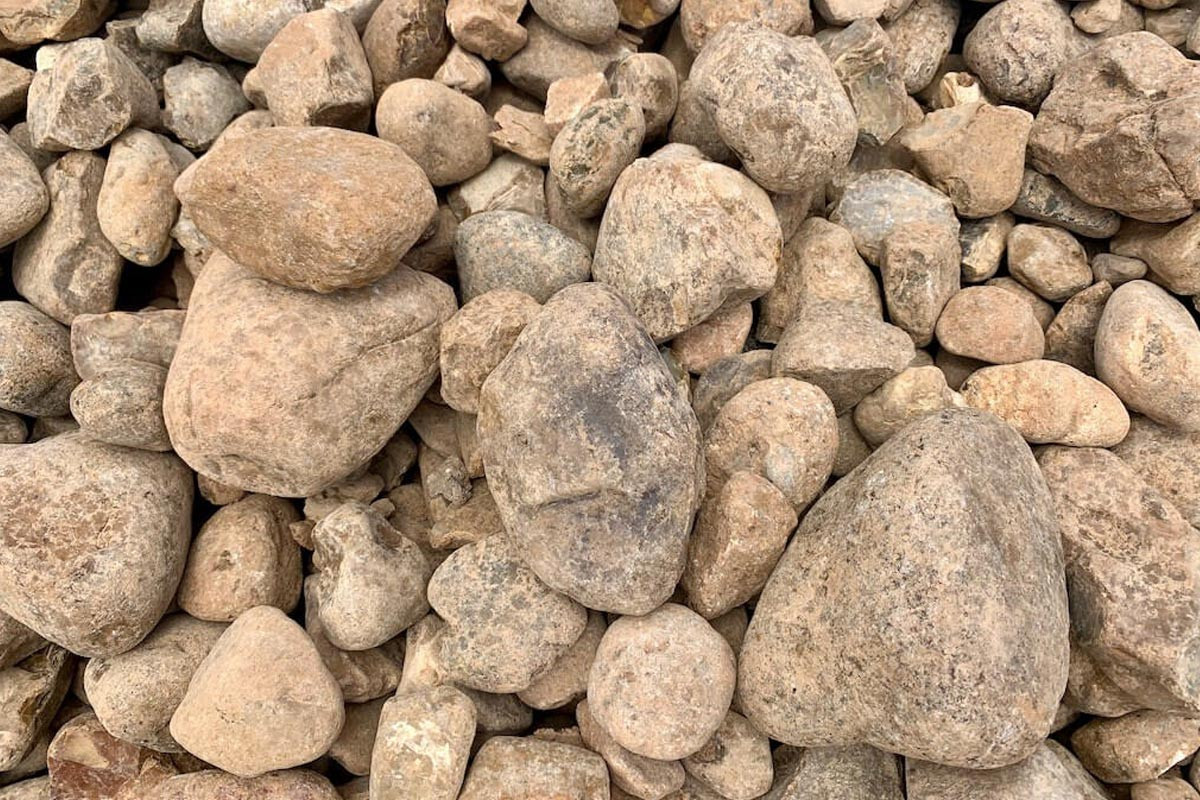How Much Is A Ton Of Rock Cost for your next landscaping project? At rockscapes.net, we understand that understanding the cost of landscaping materials like rocks and stones is crucial for planning and budgeting. This article will provide a comprehensive guide to rock prices, helping you make informed decisions and create stunning outdoor spaces. Let’s explore factors affecting the price of rock, different rock types and their costs, and how rockscapes.net can help you find the perfect solutions for your landscaping needs, including decorative rocks, boulders, and river rock.
1. Understanding the Factors Influencing the Cost of a Ton of Rock
The cost of a ton of rock can vary significantly based on several factors. Knowing these elements helps you understand price fluctuations and budget effectively.
- Type of Rock: Different types of rocks, like river rock, lava rock, and crushed stone, have varying prices due to their availability and aesthetic appeal.
- Size and Shape: Larger rocks and unique shapes can cost more due to the difficulty in quarrying and transportation.
- Location: Proximity to the quarry or supplier affects transportation costs, impacting the final price.
- Quality and Finish: High-quality rocks with polished finishes or specific colorations typically command higher prices.
- Quantity: Buying in bulk often reduces the per-ton cost compared to purchasing smaller quantities.
- Market Demand: Seasonal changes and regional preferences can influence demand, affecting the price of certain rock types.
2. Decoding Different Rock Types and Their Costs Per Ton
Understanding the variety of rock types available and their average costs per ton is crucial for effective landscaping. Here’s a detailed breakdown:
| Rock Type | Average Price Per Ton | Key Features | Common Uses |
|---|---|---|---|
| River Rock | $45 – $130 | Smooth, rounded stones; various sizes and colors | Pathways, garden beds, water features, erosion control |
| Lava Rock | $80 – $240 | Lightweight, porous; red, black, or gray colors | Mulch alternative, soil additive for drainage, heat retention in gardens |
| Large Boulders | $100 – $350 | Large, natural stones; various shapes and sizes | Focal points in gardens, retaining walls, natural seating, xeriscaping |
| Bull Rock | $65 – $130 | Medium-sized rocks, typically 2″ to 5″ in diameter | Yard drainage, French drains, landscape edging, rock gardens, driveway borders |
| Crushed Stone & Gravel | $10 – $50 | Small, angular pieces; various colors | Driveways, walkways, base material for patios, drainage layers |
| Mexican Beach Pebbles | $475 – $800 | Smooth, rounded pebbles; typically black or gray | Ground covering, driveways, walkways, dry river beds, planters, water features |
| Crushed/Decomposed Granite | $45 – $95 | Fine particles; natural colors | Pathways, driveways, ground cover, base material for pavers |
| White Stones & Pebbles | $650 – $1,300 | Typically marble or quartz; bright white color | Decorative ground cover, accent features in gardens, pathways |
| Rip Rap | $20 – $60 | Large, irregular stones; various sizes | Erosion control along shorelines, riverbanks, and slopes, retaining walls, gabion walls |
| Flagstone | Varies | Flat, sedimentary rocks; various colors and sizes; sold per square foot rather than per ton (typically $3-$15) | Patios, walkways, stepping stones, retaining walls |
| Fieldstone | Varies | Naturally occurring stones found on the surface of fields; irregular shapes and sizes | Walls, borders, accents, and more |
2.1. The Allure of River Rock: Costs and Applications
River rock, celebrated for its smooth texture and natural aesthetic, is a popular choice for many landscaping projects. How much is a ton of rock cost when it comes to river rock? Typically, you can expect to pay $45 to $130 per ton. This versatile rock is perfect for creating serene pathways, decorative garden beds, and effective erosion control solutions. Its natural appearance blends seamlessly with various landscape styles, enhancing the visual appeal of any outdoor space.
 Multi colored rounded river rocks for landscaping
Multi colored rounded river rocks for landscaping
Alt text: Multi colored river rocks create a natural and smooth surface for attractive and functional landscaping.
2.2. Lava Rock: A Lightweight and Colorful Option
Lava rock, known for its porous texture and vibrant colors (red, black, gray), offers a unique aesthetic and practical benefits. The price ranges from $80 to $240 per ton. Its lightweight nature makes it an excellent mulch alternative, and its porous structure aids in soil drainage, promoting healthier plant growth. Consider lava rock for a distinctive touch in your garden.
 Red lava rock
Red lava rock
Alt text: The striking color of red lava rock brings dramatic color contrast to garden beds and potted plants.
2.3. The Majestic Presence of Large Landscaping Rocks
Large landscaping rocks and boulders add a dramatic and natural element to any landscape. These substantial stones typically cost $100 to $350 per ton, depending on size and type. They can be used as focal points in gardens, natural seating, or to create impressive retaining walls. Their imposing presence adds a sense of permanence and grandeur to outdoor spaces.
 Large landscaping rocks and boulders for landscaping
Large landscaping rocks and boulders for landscaping
Alt text: Large landscape boulders create a natural and dramatic focal point for eye-catching garden designs.
2.4. Mexican Beach Pebbles: A Touch of Sophistication
Mexican beach pebbles bring a touch of elegance to landscaping with their smooth, rounded shapes and dark colors. These pebbles are more expensive, ranging from $475 to $800 per ton. They are ideal for driveways, walkways, and decorative ground cover, adding a sophisticated, contemporary look to any setting.
 Mexican beach pebbles
Mexican beach pebbles
Alt text: Dark Mexican beach pebbles provide a sleek and modern ground cover for driveways and water features.
2.5. Bull Rock: Versatile and Functional
Bull rock, with its medium size and rounded shape, is a versatile option for various landscaping needs. This type of rock generally costs $65 to $130 per ton. It is commonly used for yard drainage, French drains, and decorative edging, providing both functionality and aesthetic appeal.
 Bull rock for landscaping
Bull rock for landscaping
Alt text: Natural bull rock provides effective drainage solutions and borders in landscape design.
3. Maximizing Your Budget: Factors That Influence the Final Cost
Several factors can influence the final cost of your rock landscaping project. Understanding these can help you maximize your budget and avoid unexpected expenses.
- Delivery Costs: Transportation can significantly increase the cost, especially for large quantities or long distances.
- Installation Labor: Hiring professionals for installation adds to the cost, but ensures proper placement and stability.
- Site Preparation: Clearing the area, leveling the ground, and adding base materials can incur additional expenses.
- Equipment Rental: Depending on the project’s scale, renting equipment like excavators or loaders may be necessary.
- Permits: Some areas require permits for landscaping projects, adding to the overall cost.
- Additional Materials: Landscape fabric, edging, and other materials can increase the total investment.
- Rock Size and Quantity: Larger and higher quantities of rock will have higher overall costs.
4. Navigating the Market: Where to Buy Landscaping Rocks
Knowing where to purchase your landscaping rocks can impact the price and quality you receive. Here are some common options:
| Vendor | Pros | Cons |
|---|---|---|
| Home Improvement Stores | Convenient, wide range of products, easy returns | Limited selection of rock types, may not offer bulk discounts, quality can vary |
| Garden Centers | Knowledgeable staff, good selection of decorative rocks, often offer local delivery | Prices may be higher than quarries, limited bulk options |
| Rock Quarries | Direct access to a wide variety of rocks, bulk discounts, often the best prices | May require your own transportation, less convenient for small quantities, may need to order in advance |
| Landscaping Suppliers | Typically offer delivery and installation services, can provide expert advice, often have a good selection of high-quality rocks | Prices may be higher than quarries, primarily geared towards professionals |
| Online Retailers | Convenient for comparing prices, wide selection, delivery to your door | Shipping costs can be high, difficult to assess quality before purchase, returns may be complicated |
| Local Landscapers | May offer bundled deals on rock and installation, can provide professional advice and design services, often have access to rocks not available at retail stores | Prices may be higher due to bundled services, less control over rock selection |
| Rockscapes.net | Wide selection of high-quality rocks, detailed product information, inspiration for designs, connection to local suppliers and installers, expert advice available, competitive pricing | Primarily an information and connection hub; actual purchase and delivery are handled through partnered local suppliers |
4.1. Your Local Home Improvement Store
Home improvement stores like Home Depot, Lowe’s, and Menards offer a variety of bagged rocks suitable for smaller landscaping projects. They provide convenience and easy returns but may have a limited selection compared to specialized suppliers.
4.2. The Expertise of Garden Centers
Garden centers often provide a more curated selection of decorative rocks and knowledgeable staff to assist with your choices. They may also offer local delivery services, making them a convenient option for smaller projects.
4.3. Direct from the Source: Rock Quarries
Rock quarries are your best bet for a wide variety of rock types and bulk discounts. While they may require you to arrange your transportation, the savings can be significant for larger projects.
4.4. The Convenience of Online Retailers
Online retailers offer the convenience of comparing prices and having rocks delivered to your door. However, shipping costs can be high, and it’s challenging to assess the quality before purchasing.
5. DIY vs. Professional Installation: Weighing the Options
Deciding whether to install landscaping rocks yourself or hire a professional depends on the project’s scope, your skills, and budget.
DIY Benefits:
- Cost savings on labor
- Flexibility in scheduling
- Personal satisfaction
DIY Considerations:
- Physical labor and time commitment
- Potential for mistakes
- Need for specialized tools and equipment
Professional Installation Benefits:
- Expertise and experience
- Efficient and timely completion
- Ensured proper installation and stability
Professional Installation Considerations:
- Higher upfront cost
- Dependence on contractor availability
- Need to research and select a reputable contractor
6. Essential Tools and Equipment for Rock Installation
If you opt for DIY installation, having the right tools and equipment is crucial. Here’s a list of essentials:
- Shovels: For digging and moving rocks
- Wheelbarrows: For transporting materials
- Rakes: For leveling and spreading rocks
- Gloves: To protect your hands
- Safety Glasses: To prevent eye injuries
- Landscape Fabric: To prevent weed growth
- Edging: To contain the rocks
- Measuring Tape: To ensure accurate placement
- Level: To create even surfaces
- Compactor: To compact the base material
7. Maintenance Tips for Long-Lasting Rock Landscapes
Proper maintenance ensures your rock landscape remains beautiful and functional for years. Here are some tips:
- Weed Control: Regularly remove weeds to prevent them from taking over.
- Cleaning: Hose down rocks to remove dirt and debris.
- Re-leveling: Periodically re-level the rocks to maintain an even surface.
- Replacing: Replace any broken or discolored rocks.
- Preventative Measures: Use landscape fabric to prevent weed growth and soil erosion.
- Inspect and Repair: Check for and repair any damage to edging or retaining walls.
8. Inspiring Landscape Design Ideas with Rocks
Rocks can be used in countless ways to create stunning landscape designs. Here are some ideas to inspire your next project:
- Rock Gardens: Showcase a variety of rocks and plants in a harmonious arrangement.
- Dry River Beds: Create a natural-looking drainage solution with river rocks.
- Water Features: Enhance ponds and fountains with strategically placed rocks.
- Pathways: Use flagstone or gravel to create inviting walkways.
- Retaining Walls: Build sturdy and attractive walls with large boulders or rip rap.
- Xeriscaping: Design a low-water landscape using rocks and drought-tolerant plants.
9. The Environmental Advantages of Rock Landscaping
Choosing rock for your landscaping offers numerous environmental benefits, making it a sustainable choice for your outdoor space.
- Water Conservation: Rock landscapes require little to no watering, reducing water consumption.
- Erosion Control: Rocks stabilize soil, preventing erosion and runoff.
- Reduced Maintenance: Rock landscapes require less maintenance than traditional lawns, reducing the need for mowing and chemical treatments.
- Natural Habitat: Rock landscapes can provide habitat for beneficial insects and wildlife.
- Durability: Rocks are long-lasting and do not decompose, reducing waste.
- Heat Reflection: Light-colored rocks can reflect sunlight, reducing the urban heat island effect.
- Weed Reduction: Rock mulches can suppress weed growth, reducing the need for herbicides.
10. Frequently Asked Questions (FAQ) About Rock Landscaping Costs
Q1: How much does a ton of river rock typically cost?
A: River rock typically costs between $45 and $130 per ton, depending on the size, type, and location.
Q2: What is the best way to save money on landscaping rocks?
A: Buying in bulk, sourcing from local quarries, and doing the installation yourself can save you money.
Q3: How much area does a ton of river rock cover?
A: One ton of river rock typically covers 55 to 135 square feet at a depth of 2 to 4 inches.
Q4: What are the pros and cons of using lava rock in landscaping?
A: Pros include being lightweight, aiding in drainage, and providing heat retention. Cons include potential wind displacement and lack of soil nutrition.
Q5: How do I calculate how much rock I need for my project?
A: Calculate the square footage of the area, determine the desired depth, and use a rock coverage calculator to estimate the quantity needed.
Q6: What are the best types of rocks for erosion control?
A: Rip rap and large boulders are excellent for erosion control due to their size and ability to stabilize soil.
Q7: Can I use landscaping rocks for a driveway?
A: Yes, crushed stone, gravel, and Mexican beach pebbles are suitable for driveways.
Q8: How often should I clean my landscaping rocks?
A: Clean your landscaping rocks as needed, typically once or twice a year, to remove dirt and debris.
Q9: What is the difference between river rock and pea gravel?
A: River rock is larger and more varied in size and color, while pea gravel consists of small, uniform, rounded pebbles.
Q10: How do I prevent weeds from growing in my rock landscape?
A: Use landscape fabric underneath the rocks and regularly remove any weeds that emerge.
Navigating the world of landscaping rocks can be daunting, but rockscapes.net is here to help. We offer detailed information on various rock types, design inspiration, and connections to local suppliers and installers in the USA, particularly in regions like Arizona. Whether you’re planning a small garden update or a complete landscape overhaul, understanding the costs and options available is the first step toward creating your dream outdoor space. Explore our resources and transform your yard into a stunning rock landscape today.
Ready to bring your rock landscaping vision to life? Visit rockscapes.net today for inspiration, detailed information on rock types, and connections to local suppliers and experts in the USA! Let us help you create the outdoor space of your dreams!
Address: 1151 S Forest Ave, Tempe, AZ 85281, United States
Phone: +1 (480) 965-9011
Website: rockscapes.net